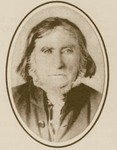
Mennonites are a group of Anabaptist Christian communities tracing their roots to the epoch of the Reformation. The name Mennonites is derived from the excommunicated Roman-Catholic chaplain Menno Simons (1496–1561) from Friesland, part of the Holy Roman Empire, present day Netherlands. Menno Simons became a prominent leader within the wider Anabaptist movement and was a contemporary of Martin Luther (1483–1546) and Philip Melanchthon (1497-1560). Through his writings about the Reformation Simons articulated and formalized the teachings of earlier Swiss Anabaptist founders as well as early teachings of the Mennonites founded on the belief in both the mission and ministry of Jesus. Formal Mennonite beliefs were codified in the Dordrecht Confession of Faith (1632), which affirmed "the baptism of believers only, the washing of the feet as a symbol of servanthood, church discipline, the shunning of the excommunicated, the non-swearing of oaths, marriage within the same church", strict pacifistic physical nonresistance, anti-Catholicism and in general, more emphasis on "true Christianity" involving "being Christian and obeying Christ" as they interpret it from the Holy Bible.

Mennonite Church Canada, informally known as the General Conference, is a Mennonite denomination in Canada, with head offices in Winnipeg, Manitoba. It is a member of the Mennonite World Conference and the Evangelical Fellowship of Canada.
The Swiss Mennonite Conference is an Anabaptist Christian body in Switzerland.

Conrad Grebel was a co-founder of the Swiss Brethren movement.
Old Order Mennonites form a branch of the Mennonite tradition. Old Order are those Mennonite groups of Swiss German and south German heritage who practice a lifestyle without some elements of modern technology, still drive a horse and buggy rather than cars, wear very conservative and modest dress, and have retained the old forms of worship, baptism and communion.

Conrad Grebel University College is a university college affiliated with the University of Waterloo in Waterloo, Ontario, Canada. It is affiliated with the Mennonite Church Canada.
Allen James Reimer was a Canadian Mennonite theologian who held a dual academic appointment as Professor of Religious Studies and Christian Theology at Conrad Grebel University College, a member college of the University of Waterloo, and at the Toronto School of Theology, a consortium of divinity schools federated with the University of Toronto. At the University of Waterloo's fall 2008 convocation, he was named Distinguished Professor Emeritus, an honor seldom bestowed on retired faculty.
The Swiss Brethren are a branch of Anabaptism that started in Zürich, spread to nearby cities and towns, and then was exported to neighboring countries. Today's Swiss Mennonite Conference can be traced to the Swiss Brethren.
Cedar Grove is a community in Markham, Ontario on the Little Rouge River. It is centred on 14th Avenue and Reesor Road and within the boundaries of the future national Rouge Park.

Abram Bowman Kolb (1862–1925): teacher and publisher; born 10 November 1862 near Berlin, Canada West, to Jacob Z. and Maria (Bowman) Kolb. Kolb is notable for editing Words of Cheer and Herald der Wahrheit. He also translated manuscripts including the Enchiridion of Anabaptist leader Dirk Philips, and Restitution by Henry Funk. He was the oldest son in a family of five sons and two daughters. On 3 January 1893, he married Phoebe Funk, the second daughter of John F. Funk. They had two daughters and two sons. Abram died 15 March 1925.
The Oklahoma Bible Academy (OBA) is an interdenominational Christian private school located in Enid, Oklahoma. OBA is the oldest coeducational private school in the state of Oklahoma.

Eden High School, also known simply as Eden, is a public secondary school in St. Catharines, Ontario, Canada. It is located on the corner of Lake St. and Linwell Rd. Eden is a part of the District School Board of Niagara (DSBN). The school was founded in 1945 as Eden Christian College.
The Beachy Amish Mennonites, also known as the Beachy Amish or Beachy Mennonites, are a Conservative Anabaptist tradition of Christianity.

Altona is a ghost town located in Pickering, Ontario, at Sideline 30 and the Pickering-Uxbridge Town Line. It is just east of Whitchurch-Stouffville, and was named after Altona, now a borough of Hamburg, Germany.

The Global Anabaptist Mennonite Encyclopedia Online (GAMEO) is an online encyclopedia of topics relating to Mennonites and Anabaptism. The mission of the project is to provide free, reliable, English-language information on Anabaptist-related topics.
New York Mennonite Conference is a regional conference of Mennonite Church USA comprising 14 churches Upstate New York.

Abraham Stouffer is the founder of the town of Stouffville, Ontario.

Peter Reesor was one of the original settlers of Markham, Ontario.
The Markham-Waterloo Mennonite Conference (MWMC) is a Canadian, progressive Old Order Mennonite church established in 1939 in Ontario, Canada. It has its roots in the Old Order Mennonite Conference in Markham, Ontario, and in what is now called the Regional Municipality of Waterloo. The Conference adheres to the 1632 Dordrecht Confession of Faith. The Markham-Waterloo Mennonite Conference is in fellowship with two similar car-driving Old Order Mennonite churches: the Weaverland Mennonite Conference and the Ohio-Indiana Mennonite Conference.
The Sommerfelders, also called Sommerfeld Mennonites or Sommerfeld Mennonite Church, are a Christian group.











